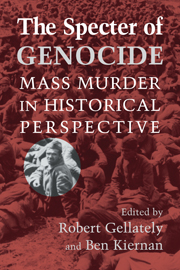Book contents
- Frontmatter
- Contents
- List of Contributors
- Acknowledgments
- INTRODUCTION
- PART I GENOCIDE AND MODERNITY
- 2 Twentieth-Century Genocides
- 3 The Modernity of Genocides
- 4 Seeking the Roots of Modern Genocide
- 5 Genocide and the Body Politic in the Time of Modernity
- PART II INDIGENOUS PEOPLES AND COLONIAL ISSUES
- PART III THE ERA OF THE TWO WORLD WARS
- PART IV GENOCIDE AND MASS MURDER SINCE 1945
- CONCLUSIONS
- Appendix: Convention on the Prevention and Punishment of the Crime of Genocide
- Index
5 - Genocide and the Body Politic in the Time of Modernity
Published online by Cambridge University Press: 05 June 2012
- Frontmatter
- Contents
- List of Contributors
- Acknowledgments
- INTRODUCTION
- PART I GENOCIDE AND MODERNITY
- 2 Twentieth-Century Genocides
- 3 The Modernity of Genocides
- 4 Seeking the Roots of Modern Genocide
- 5 Genocide and the Body Politic in the Time of Modernity
- PART II INDIGENOUS PEOPLES AND COLONIAL ISSUES
- PART III THE ERA OF THE TWO WORLD WARS
- PART IV GENOCIDE AND MASS MURDER SINCE 1945
- CONCLUSIONS
- Appendix: Convention on the Prevention and Punishment of the Crime of Genocide
- Index
Summary
The term “genocide” derives from the Greek word genos (“race”) and cide (from the Latin occidere, meaning “to kill”). It was introduced in 1944 by the jurist Raphael Lemkin and refers to a type of mass killing widely regarded as the most egregious of crimes. Lemkin identified the phenomenon itself decades earlier, in the massacre of the Armenians in Turkey. In 1921 he insisted that the doctrine of state sovereignty was not a license to kill millions of innocent people, and he agitated in the 1930s for international support from criminal lawyers to address the question of what to do about murderous regimes. Finally, in the 1940s, in the aftermath of war and Nazi atrocities, he and other jurists successfully pressed to get genocide recognized as a crime in international law. The definition provided by the 1948 Genocide Convention registered the considerable anxiety Lemkin felt about planned and systematic state persecution and destruction of racial and religious groups. Although he had also voiced concerns about criminal mistreatment of “social” groups, the General Assembly of the United Nations, under pressure from the Soviet Union, retreated from what looked like a possibility of including “political and other groups” in the list of potential victims.
Some researchers are now convinced that genocide is not really a new crime at all and that genocidal acts against helpless populations have been going on for many centuries, perhaps even thousands of years.
- Type
- Chapter
- Information
- The Specter of GenocideMass Murder in Historical Perspective, pp. 97 - 114Publisher: Cambridge University PressPrint publication year: 2003
- 1
- Cited by



